T he L o op
THE JOURNAL OF FLY CASTING PROFESSIONALS SPRING 2022



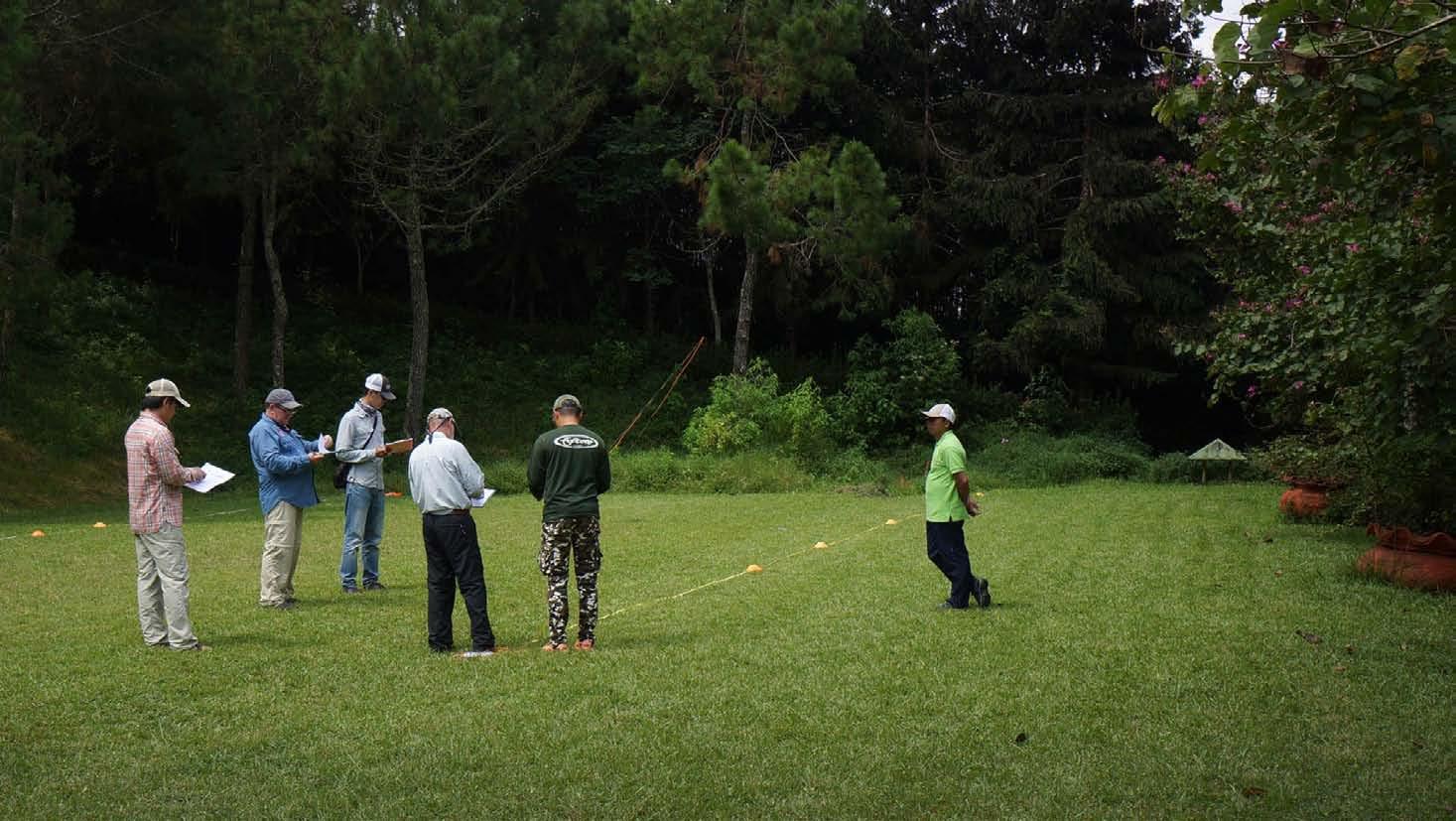
In this issue:
New MCI Test Experience by Gary Turri
Fly Line Care by Bruce Richards
CICP Update by Jonathan Walters
... and more
Cover photo: A truly International event, a FFI CICP Exam in the tropical rainforest of Bandung in West Java, Indonesia with participants from 5 different countries. Examiners are Brian Henderson (Australia) & Bill Higashi (Japan) examining the candidate Marco Teng (Macau, China), observed by two EDP participants Hank Wu (Taiwan) and Roger Elton (Australia) and on the right the interpreter Henry Lau (Singapore). Photo by Bintoro
Editorial
Northern California, where I live, had a trying winter. The weather has been mild and dry, and we are concerned about the effects of drought during the upcoming summer. The omicron variant restricted activities over the winter just when we had hoped that COVID was on the way out.
Despite these concerns, there are signs of spring as I look out my window. The natural system is responding to warmer temperatures and longer periods of daylight. New life is evident. Trees and flowers are blooming, and blue-wing olives are floating like sail boats on Hat Creek and the Sacramento River.
Similarly, a new spring is emerging for FFI’s Casting Instructor Certification Program (CICP). Although many of us may have some Zoom meeting fatigue, it and similar platforms have allowed us to discover new ways in which to interact with people across the globe who are interesting in learning or sharing their knowledge about fly fishing and fly casting.
WANTED
Although not completely new, the use of virtual mentoring is growing to help individuals successfully prepare for CICP certifications. Planned opportunities for in-person events are increasing.
This spring issue of The Loop provides a glimpse of 2021 activities and new things to come. Jonathan Walter, chair of the Casting Board of Governors, provides a summary of key accomplishments of 2021 and plans for 2022. James Sommercorn introduces updated single-hand CI exams. Jody Martin and Audrey Wilson describe the first ever CICP Community Gathering held via Zoom that allowed all CICP members to provide input on future directions. Gary Turri shares his experiences in preparing for and passing the MCI exam. Bruce Richards helps us to prepare for spring and summer fishing by discussing fly line care and maintenance. I enjoyed reading all these articles and I hope you will as well.
Jim Wigington - Editor in Chief
We’re calling for article ideas from all CICP members, all casting instructors, and all fly fishing photographers worldwide.
Please email your ideas and photos to: loop@flyfishersinternational.org

2 New MCI Exam Experience P.3 CICP Community Event P.13 IN THIS ISSUE Fly Line Care P.8 Revised CI Exam P.16 Editorial Team P.18 CICP Update P.10 New Registered Instructors P.17 Contact Us
THE LOOP, SPRING 2022
A MASTER’S JOURNEY and Advice on The New MCI Exam
Gary Turri
When I successfully passed my CI exam on the first attempt, my lead examiner thanked me for being well prepared. At that point, I knew I wanted to become an MCI, and wanted to be well prepared for my MCI exam and hopefully pass on the first attempt.
I was elated this past October, when the lead examiner for my MCI exam shook my hand and said I successfully passed. I was very honored to be one of 220 MCI’s worldwide. In this article, I share my MCI preparation journey and my test experience. I hope what I share can help other instructors preparing for the MCI exam.
The MCI Journey Begins
After passing the CI Exam in November 2014, I continued to cast the CI Exam tasks on a regular basis. As a Lead Instructor at Golden Gate Angling and Casting Club, I already knew that my fellow CI Candidates would be asking for help on their CI Journey. I also realized that the MCI Exam would require casting expertise at a much higher level than the CI Exam.
Along with teaching students and CI Candidates at Golden Gate, I also began to teach individual and group casting lessons on my own. This forced me to create my own written lesson plans, to be aware of the time allotment during lessons and also how to use classroom management when teaching casting to a group of students.
As a individual instructor teaching a group of six students, you soon learn the value and the necessity of using the teaching techniques such as Pair Share, Praise-Prompt-Leave, and the Richards Six Step Method. Doing all of this teaching, both at Golden Gate and on my own really helped to build my teaching skills and my confidence as a Certified Instructor. To all Certified Instructors, I cannot stress enough the importance of doing a lot of teaching whether you’re an MCI Candidate or not.
As I continued on the MCI journey, I soon realized that the time commitment was more than I could devote as a working man already with a full schedule. I continued to devote whatever time I could to casting and instruction development but knew that this journey would have to wait until retirement. I still made myself available to teach students and help other instructors when asked.
In 2018, I retired and now had the time I needed to devote and focus on preparation for the MCI. A first step was to meet with my mentor and develop an action plan for my preparation.
As a MCI candidate, I now played the role of both coach and student. Most of my practice sessions were alone, so I would often set up a tripod and iPad to video my casts, mainly my back casts. I would then analyze my loops using the six-step method and then tell the student
3
THE LOOP, SPRING 2022
continued ...
(myself) what corrections to make to my casting mechanics. Using the OnForm app allowed me to closely follow my rod tip path and casting mechanics in slow motion. The self-analysis on video was a game changer for me and I highly recommend it to all instructors.
Two fellow MCI candidates from Golden Gate, who also had retired recently, became my MCI study buddies and we would meet as often as possible. There are two benefits of having other skilled instructors watch you cast. First, with their trained eyes they can provide realtime feedback which allows you to make corrections to your casting mechanics during a practice session. Second, it also helps you become comfortable being watched by other instructors, which helps prepare you for exam day.
I also met frequently with my mentor who is a MCI and L2 examiner. I was fortunate to have the same mentor for both the CI and MCI journeys so we had a great long-term relationship in both teaching and training together. He always provided the honest and accurate feedback that every candidate needs to hear. Wise candidates heed the advice of their mentors.
As I worked through the various grass and water tasks, I would often break the more difficult casts down into steps. Several casts required very precise rod tip movements and I found that pantomiming the movements in slow motion (without fly line) allowed me to be much more precise.
When I felt ready to cast, I would learn the cast with a shorter amount of line than the task called for. Using a shorter length of line allows you to reduce the effort, slow the casting movements down and make some passable casts in a shorter time. As I became more comfortable
with the casts and the quality of the loops, I would add more line and work my way up to the required exam distances. This teaching method that I used to train myself worked well for me, and it’s the same method that I often use with my students.
In early 2020, the Coronavirus appeared and everything flyfishingrelated for me pretty much came to a stop. There were no more in-person meetings at fly fishing clubs, casting events and flyfishing shows were cancelled and so the many opportunities to teach students were gone. I taught very few casting lessons and hardly left home to go fishing, choosing instead to remain safe near home. However, this did free up my schedule and provide much more time to do focused practice sessions for the MCI Exam. Some days I would cast section 1A in the morning and then section 1B in the afternoon. I spent the daylight hours working on Casting Section 1 or revising and rehearsing my lesson plans for the Teaching Section 2. In the evening hours, I spent the quiet time working on the Interview and Discussion Section 3. I read some of the books on the recommended reading list as well as every back issue of The Loop journal. I also worked through all of the representative questions that are listed on the FFI website.
I continued to meet with my mentor every few months to review my progress and to determine what areas were good and what needed improvement. After each session together, we would layout the path forward.
Exam Day
My exam is scheduled for 9am. I arrive around 7am so I can have time to set up a tape measure and run through the grass section to warm up. Unfortunately, it’s pouring rain so hard that I must remain in my vehicle for it to settle down a bit.
4
Gary Turri’s MCI Journey
LOOP, SPRING 2022
THE
THE LOOP, SPRING 2022
Gary Turri’s MCI Journey continued ...
The rain finally lets up, and I step out of my vehicle as a very relaxed and confident MCI candidate. My many years of training and teaching have prepared me for this day. I did not feel like an MCI candidate that was hoping to pass this exam, but more like a master that was about to share his casting and teaching mastery with three other masters.
The wind is up, but it is not a problem because I had trained in the wind and had a wind strategy for every task.
I set up three tape measures and soccer cones at different angles so I can perform all the grass tasks with wind from any direction, simply by stepping over to a different tape. I now go through several of the grass tasks to warm up and get a read on the wind.
My examiners arrive on time. I greet the team of three examiners and the lead examiner verifies my equipment and then previews the exam. The entire exam goes smoothly, my team of examiners worked extremely well together, sharing the job of reading the tasks and asking questions. My exam experience was relaxed and very positive, and my examiners had positive comments after the exam.
What I Learned from the MCI Journey
The people with whom I interacted during my journey were an important part of my success. Thank you to all of the instructors who I had the good fortune and the pleasure to spend time with and learn from on the CI and MCI Journey.
Achieving the MCI certification is not the end of the journey but rather a checkpoint or a confirmation of where
you’re currently at on your “never ending journey” as a certified casting instructor. The FFI Casting Instructor Code of Conduct clearly states our responsibility to maintain both our casting and teaching skills sufficient to be able to demonstrate and teach casting. To simply quit learning or teaching would be a waste of one’s knowledge and skills. The FFI offers opportunities for all instructors to maintain or advance their casting and teaching skills through “Continuing Education.”
All instructors should embrace Continuing Education and also keep an open mind to new ideas and teaching methods.
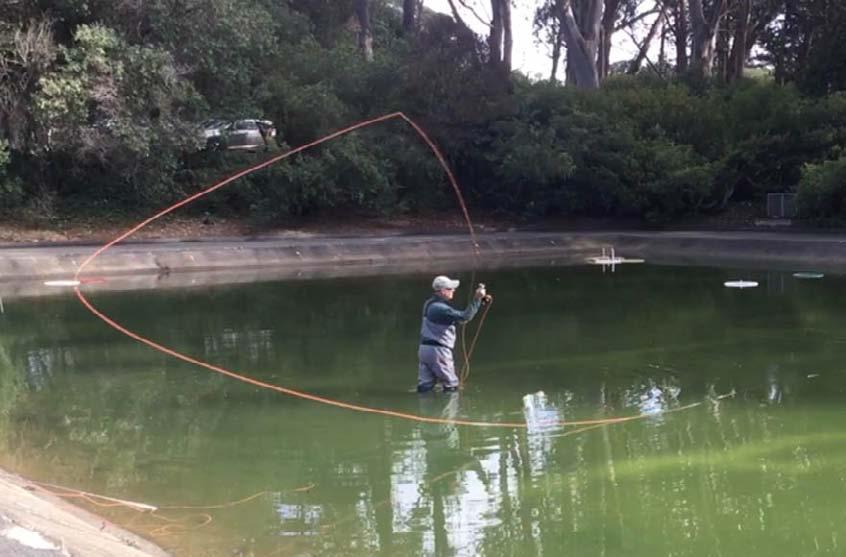
5
THE LOOP, SPRING 2022
Gary Turri’s MCI Journey continued ...
Just look how the newly released OnForm app has greatly improved our video analysis. It’s a remarkable tool for our candidates and our students.
Two of my favorite quotes from Mel Krieger are: “If you’re very fortunate, you will understand that the complex and profound path towards teaching mastery gets two miles farther away for every mile that you travel.” and, “When you reach the top of the mountain- keep climbing!”*
Advice to MCI Candidates (What worked for me)
Casting - Section 1.
• Read the book “Practice Perfect” by Lemov. This book will educate you on how to get the most out of your practice time.
• Select your casting gear carefully. Experiment with different rods and fly lines. When you find the right rod and line pairing, then pick a reel that balances the outfit to optimize the feel when casting. Make sure the cork grip fits your hand and rework it if necessary. Fine tune the leader length, taper and diameter with the correct size yarn fly so you get a smooth turnover without kick and you can easily hover the fly.
When you’re satisfied with your final selection, be picky about your gear and keep it in perfect condition so your practice sessions will be more consistent. Attention to the details does make a difference.
• Mark your practice fly lines so you know the exact distances from feet to fly. This will save time when gong through the different tasks and make your practice sessions more efficient.
• Always set up the practice tape and cones to the required distances, never guess or estimate.
• Start with Task #1 (narrow loops at 50 feet) but only cast the amount of line you can control while meeting the exam standards. Slowly add line and work your way up to 50 feet. Spend whatever time is needed to master this task.
• Use an iPad mounted on a tripod and learn how to use the OnForm App. Video your loops and pay close attention to your pickup and backcast loops.
• Be sure to practice on windy days so you can overcome the mental distraction that wind causes. Develop a wind strategy for every single casting task. Learn which wind direction makes each task easier, not more difficult.
• Be sure to carefully read the entire MCI Exam multiple times. Make sure you understand every word. Be sure to follow both the General Performance Standards on page 4 and the Task Specific Performance Standards. Get to know the entire exam content extremely well.
• Take notes during your practice sessions. Use the notes to help you remember your break through moments and when problem solving. Refer to your notes often.
Teaching - Section 2.
• Teach every opportunity that you have! As a CI, you should be teaching individual students and group lessons and also students of all skill levels. This will help you create your own lesson plans and help refine your teaching skills, which will also help boost your confidence as a certified casting instructor.
• Teach whenever invited by other certified casting instructors, especially masters.
6
THE LOOP, SPRING 2022
Gary Turri’s MCI Journey continued ...
Be sure to take notes as you watch and learn how they teach. Keep an open mind to all instructors and use what works best for you.
• Teach CI Candidates how to teach students and also help them along on their CI Journey. MCI Candidates must be able to “teach the teachers” and also be very familiar with the current CI Exam.
Interview and Discussion - Section 3.
• Don’t wait until the final stages of the MCI Journey to start the Interview and Discussion section. There is a long list of sample questions to research, some are easy and some that take more time. Doing this section while doing the casting and teaching sections will help tie everything together. In fact, your MCI journey should follow a parallel path where you spend balanced time across all three sections.
• Get advice from your mentor on the books, videos, study materials, etc. that you should focus on. Some items on the list are an absolute must and some are not.
I read every article in The Loop (FFI Casting Journal available online) and gained considerable knowledge on both casting and teaching.
• To increase your knowledge on any questions related to different fish species and the related fishing methods, I recommend going on a destination trip that’s unfamiliar to you and taking lots of notes “while” on the trip. When you return home, use those notes to write a lesson plan on how you would prepare a student for the same trip. Then teach that lesson plan to your students. These destination trips will increase your knowledge of the species and also improve both your casting and your teaching skills.
In conclusion, I wish good luck to all MCI Candidates. The MCI journey will make you a better caster, teacher, mentor and angler.
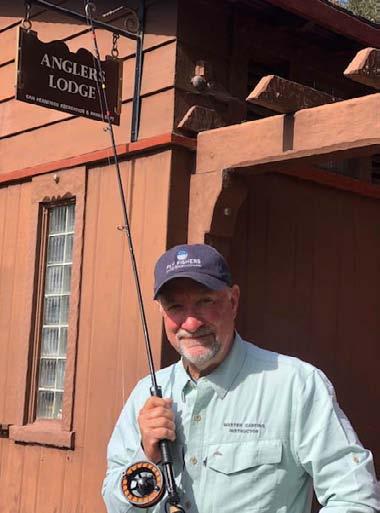
About the author:
Gary Turri is a Lead Casting Instructor at Golden Gate Angling and Casting Club in San Francisco, California. He was certified as a Master Casting Instructor in October 2021.
He is the first North American to pass the most recent version of the MCI exam.
*Quotes are from the pamphlet: OBSERVATIONS ON TEACHING FLYCASTING by Mel Krieger
7
INDEX
FLY LINE CARE AND MAINTENANCE
Bruce Richards
Fly lines today are pretty amazing. Coating chemistry has improved dramatically over the last couple of decades and many of the line problems of the past are largely gone. Floating line flotation is hardly an issue anymore and line cracking is rare. Lines perform much better than before and are much more durable. However, they do still require some common sense care and maintenance for best performance and durability.
Although fly line coatings are tough they can be damaged. Lines are commonly damaged in boats, there are a lot of hard and sometimes sharp surfaces on and in boats. To prevent damage when fishing from a boat it makes sense to quickly check for sharp edges that might cut your line. Lines blow around and go places you might not expect. If you ever use a motor of some sort it is pretty important to keep your line away from the propeller, obviously. Also, if wade fishing where there are sharp rocks be sure not to step on your line.
Other things that damage fly lines are heat, light and solvents or other damaging chemicals. I live in Ennis, MT and it seems half the cars/ trucks have one of those rooftop rod racks, and they are handy. But most of them have reel lockers at the back that are black. If you leave your rods in those racks and park outdoors your reels and lines are going to cook in the summer sun. Leaving your lines in you vehicle when parked in the summer sun is almost as bad. Lines have fluids in their coatings that are critical for their performance and durability. When exposed to excessive heat those fluids leach out of the line more quickly and the line will become stiff. Over time the line will
become brittle and crack, best to not store your rigs long term in your rod rack or inside your vehicle if it will be parked in the sun.
Light can be an issue too. Long term exposure to sunlight will cause line colors to fade. And of course, with sunlight there is often heat. The relatively short term exposure when fishing isn’t a big problem but if lines are stored on reels in places where they are exposed to sunlight (boat rod racks, rod racks on porches, etc.) fading can be expected.
There are also many chemical compounds that damage line coatings. Solvents are especially bad and some will dissolve line coatings. Other chemicals found in insect repellents, sun screens and even some old fashioned line dressings damage lines too. It is best to avoid line contact with substances not specifically intended for use on fly lines. It is very common to see damage on lines only in the area that is handled by the angler frequently. If you use sun screen when you fish, or insect repellent, make sure you wash your hands before handling your line. What is on your hands will get transferred to your lines. Lines that are damaged this way are easy to identify, all the damage is isolated to the part of the line handled most.
Many of the best lines made today have advanced coatings that are very slick and hydrophobic. Those attributes help lines haul, shoot and float much better. But if those coatings are dirty much of the benefit of the advanced chemistry is covered up and lost. For the coating to work it cannot be covered in dirt.
8
LOOP,
THE
SPRING 2022
Fly Line Care and Maintenance
continued ...
Dirty lines also have more friction in the guides which reduces casting performance and also reduces line durability.
When floating lines are very hydrophobic, very water repellent, they float high in the surface tension. Very hydrophobic coatings only work when they are exposed directly to the water. If the coating is covered with dirt the benefit of being water repellent is lost and the line won’t float as well as it should.
Fortunately it is easy to preserve a lines coating performance properties simply by keeping it clean. Cleaning a line is simple, dampen a soft cloth with water then rub some hand soap on it. Scrub the line with the cloth then rinse with water. Using a mild soap is important. Harsh detergents will clean the line but will be hard on the coating. Hand soaps are designed to remove dirt from human skin without removing skin oils and drying the skin. They do the same to a line; remove the dirt; leave most of the important fluids. Your lines will last a lot longer and perform better if they are kept clean.
Scientific Anglers makes a line cleaning pad that works very well. It is a very mild abrasive and can be used either wet or dry. It will remove dirt deposits quickly while not damaging the line coatings. They are quick and easy to use and last a long time.
If your lines are not the type with high tech very slick, hydrophobic coatings you might want to dress your lines after cleaning. This will temporarily improve line slickness and flotation; dressings eventually wear off. It is best to use a dressing sold by one of the major fly line manufacturers as they will certainly not include an ingredient that will damage fly lines.
How should you store your fly lines in the off-season? It’s 2F here in Montana right now, definitely the off-season! Most important is to store them so they are not exposed to excessive heat or light. A cool basement is good, an uninsulated shed or garage that gets hot in the summer is not. If you find a good deal on fly lines and buy some for use at a later date, storing in the refrigerator or even freezer will essentially stop aging. Coating chemistry now is very stable so there is less need for extra cold storage than in “the good old days”, but it won’t hurt.
Some anglers remove their lines from their fly reels in the off season and spool them onto larger diameter drums or hang them in big loose coils. This does no harm to lines but isn’t necessary either. All fly lines have memory and take the shape of what they are stored on. That memory (line coils) is easily removed by stretching the line right before use. Storing your lines in big coils doesn’t prevent or minimize line memory when you put the lines back on reels when the season starts. Store your lines on your fly reels and save yourself some time! Maintaining fly lines is simple and easy. Don’t expose them to things that might damage them and keep them clean!
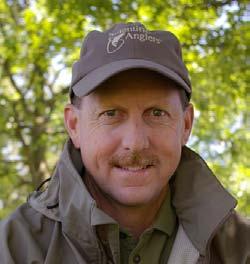
Bruce Richards, MCI, Montana, USA, have designed many great lines for Scientific Anglers and wrote the seminal work - “Modern Fly Lines”. He is one of the editorial team of The Loop.
9
INDEX
THE LOOP, SPRING 2022
A Look Back and a Look Forward: THE CASTING INSTRUCTOR CERTIFICATION PROGRAM (CICP)
My name is Jonathan Walter and I was elected Chair of the Casting Board of Governors (CBOG) in July of 2021. I am honored and humbled to take over this position. I will do my best in the coming 2 years to move the CICP forward. I write this article on behalf of all members of the CBOG. 2022 is the 30th anniversary of Casting Instructor Certification Program and the CBOG is discussing plans for the year, which will include remote continuing education offerings and outreach. I would like this to be a year of outreach to our community and a model for the future. My door is open for discussion or suggestions at j_walter@msn.com or 303-918-8116.
Now for a look at 2021 as it has been an eventful year:
• The single hand CI exam has been revised and will take effect June 1, 2022 (see article in this issue of The Loop Fall 2021 by Jame Sommercorn about the CI Performance Exam. There will also be a new CI workshop, an improved written exam, and a revised CI Study Guide forthcoming. Our thanks to Jim Sommercorn MCI, Jim Wigington MCI, Bruce Richards MCI and the rest of the Exam Committee for their work.
• Those individuals preparing for the old THCI, now the new THMCI, may take the new THMCI exam without first certifying on the new THCI exam until December 31, 2022.
• There is now an entry level Two Hand Casting Instructor exam (THCI) focusing on shooting heads (Scandi and Skagit). The old THCI exam is now a THMCI exam focusing on long belly or traditional Spey lines and casting.
• Despite Covid, certification exams took place! Worldwide, we administered 32 CI exams, 1 MCI exam and 2 THMCI exams. Congratulations to 23 new CI’s, 1 new MCI and 2 new THMCI’s!! Job well done! (See the recent Loop for the list!) Our exam pass rates are improving thanks to the efforts of our mentoring MCI’s. We hope for even more exams in 2022.
• For all those candidates with exam delays due to the pandemic, please hang in there! We can only imagine your disappointment. We look forward to getting everyone that wants an exam accommodated as soon as the pandemic and associated restrictions allow us to do so. Keep an eye on the Calendar of Events Calendar of Events
10
Jonathan Walter
THE LOOP, SPRING 2022
Click to download the New CI Exam Click to download the New THCI Exam Click to download the THMCI Exam Click to read about the new FFI REGISTERED INSTRUCTORS Click for information of the upcoming CICP EXAM DATES
The CICP Program
continued ...
• The new Fly Casting Skills Development Program was finalized and is available on the website. This is a more user friendly version of the Skills Challenge and will be used by instructors and anglers alike. It is a great way to improve casting for fishing! Many thanks to the Skills Challenge Redesign group: Brian Henderson MCI THMCI, Jim Sommercorn MCI, Jim Valle MCI THMCI, Jeffrey Graham CI, Jim Schneider MCI, Russ Carpenter CI and Sarah Trenschel.
Click to read about the CASTING SKILL CHALLENGE
• Eight new casting instruction videos were added to the Learning Center! Thank you to Dok Arvanites MCI, Bruce Richards MCI and Jim Sommercorn MCI. See the videos here Learning CenterCasting Instruction (flyfishersinternational.org)
• The Virtual Expo was a great success! It was an international event: several countries outside the US were represented. Nearly 600 people attended and watched videoconferences on fly casting, fly tying and conservation. There were over 20 casting presentations with preparations spearheaded by Bruce Williams, MCI, THMCI. Many thanks to the MCI’s and CI’s that took up the challenge of teaching casting live by video conference. You are all to be commended as you have stepped into one aspect of the future of casting instruction. The Virtual Expo was a silver lining in the pandemic cloud!
• Several of our members are using video extensively to teach students and even coach candidates for the CI exam. These are pioneering efforts led by Molly Semenik MCI THMCI, Mary Ann Dozer MCI, Dave Barron MCI, Bruce Richards MCI, Bruce Williams THMCI, and myself. Look for an article in The Loop in the near future to learn more.
• Members of our casting community were honored this year with special awards:
Mel Krieger Award for Casting Instruction: Mac Brown, MCI and John Till, MCI
Floyd Franke Award for Contributions to the CICP: Steve Hollensed MCI and Bryan Martin MCI THMCI
Governor’s Mentoring Award: Jim Schneider MCI. Learn about the details of these awards here:
Click to read about the CASTING BOARD OF GOVERNORS AWARDS
• Jody Martin, CI took initiative to identify casting activity leads in each Council in the US. Thanks, Jody! Regional representatives are being established internationally also through Brian McGlashan, MCI, THMCI. We hope this structure will assist with outreach and coordination of efforts worldwide.
• Continuing education was resumed by the committee of Gail Donoghue MCI, Phil Gay MCI, Mary Ann Dozer MCI, and Dave Cleaves MCI. Attendees found the Zoom meetings quite informative and there are plans for more offerings in 2022. Stay tuned and take advantage of these great upcoming programs.
11
THE LOOP, SPRING 2022
Click to view the CASTING INSTRUCTION VIDEOS
THE LOOP, SPRING 2022
The CICP Program
continued ...
• Outreach to all CICP members and known CI Candidates will begin in 2022 as planned by Mary Ann Dozer MCI, Audrey Wilson CI and Jody Martin CI. This will start building networks, facilitate sharing of knowledge, and strengthen the community. We look forward to your participation.
• Finally, I wish to thank my predecessor, Bruce Williams, my CBOG colleagues and CBOG committee and working group members. You did the work!
• For anybody or anything I’ve forgotten, my apologies and thank you!!
If you have questions about anything above or suggestions for future events or online offerings, please let me know by emailing me at j_walter@msn.com or to the Casting Coordinator, Nikki Loy at casting@flyfishersinternational.org.
Thank you for reading and our best to you in 2022!! Please pass this article along to anyone, such as CI candidates, wanting to learn more about the program
The FFI Casting Board of Governors:
Dave Barron MCI, Thomas Berggren MCI THMCI, Mary Ann Dozer MCI, Jeff Ferguson MCI, Gail Donoghue Gallo MCI (Secretary), Willy George MCI, Brian Henderson MCI THMCI, Steve Hollensed MCI, Mark Huber MCI THMCI, JF Lavallee MCI, Tim Lawson MCI, Bryan Martin MCI THMCI, Jim Sommercorn MCI, Todd Somsel MCI THMCI, Jonathan Walter MCI (Chair), Bernd Wiesbauer MCI THMCI, Bruce Williams MCI THMCI.
IF YOU ARE INTERESTED WITH THE FFI CASTING INSTRUCTOR CERTIFICATION PROGRAMS
Please click these following links for further information on:
Click
Click
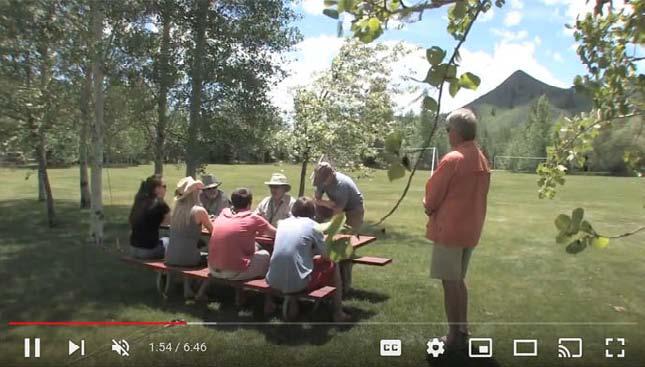
12
INDEX
Casting Instructor Certification Program CI, MCI, THCI and THMCI study materials
here to download CI, MCI, THCI and THMCI Exams
Casting Instructor Introduction Talk
here for further information on Next available CICP Exam dates. Certified
Casting Board of Governors Kicks Off The First “CICP Community Gathering”
Jody Martin and Audrey Wilson
On February 5, 2022, the FFI Casting Board of Governors (CBOG) initiated a Zoom meeting for all members of the Casting Instructor Certification Program (CICP), broadly defined. The first of its kind, the meeting, titled the CICP Community Gathering, was part of a promised “… year of outreach” outlined by CBOG Chair Jonathan Walter in his end-of-year email message of January 14. Recognizing that “… our community is only as strong as our connections and shared knowledge,” this open and interactive meeting was a longneeded start to improving communications between the CBOG and the larger fly fishing community. Invitations, as well as a brief survey, were sent out in January to all FFI certified casters at all levels, all mentors, every Casting Director in each of the 17 U.S. FFI Councils and their counterparts in other countries, and all students known at the time to be interested in pursuing certification at any level. The gathering was the brainchild of CBOG member Mary Ann Dozer (MCI) and CBOG Chair Jonathan Walter (MCI). In addition to these CBOG members, the CBOG Outreach Working Group, responsible for the meeting’s organization and content, also included champion caster Audrey Wilson (CI) and the Southwest Council’s Jody Martin (CI).
Response to the invitation was immediate and gratifying; approximately 132 people responded and attended the Zoom meeting (see Fig. 1). Attendees included FFI members from all 17 Councils in the U.S. as well as from Canada, Iceland, Great Britain, Australia, and Italy.
After attendees were warmly welcomed by Audrey and all new (2021) casting certification recipients were congratulated by Jody, CBOG Chair Jonathan Walter summarized highlights of the past year and goals and aspirations of the CBOG for 2022. Mary Ann Dozer then introduced the five breakout groups that attendees were invited to attend. The breakout groups addressed seven topics: the New CI Certification Test and Study Guide (discussion led by Molly Semenik), the MCI Exam (led by Sekhar Bahadur), the New THCI and THMCI Distinctions (led by Rick Williams), the Fly Casting Skills Development program (led by Brian Henderson), Continuing Education (led by Gail Donoghue Gallo), how to Build Enthusiasm for Casting Instruction (led by Audrey Wilson) and how to Build Enthusiasm in Our Community (led by Mary Ann Dozer).
By any measure, the meeting was a tremendous success. Fruitful discussions in all of the breakout groups led to positive suggestions for improvement in every category, from more frequent communications to new online teaching methods. The salient takehome points from each discussion can be summarized as:
CI Test and Study Guide: Uncertainty remains concerning the number of, and how to locate, exam events. More information and education are needed to help with preparation.
MCI Exam: Main issues are the lack of connectivity at all levels and the perceived gap between study materials and mentors; better study materials for this exam would be helpful.
13
THE LOOP, SPRING 2022
THE LOOP, SPRING 2022
CICP Community Dathering
continued ...
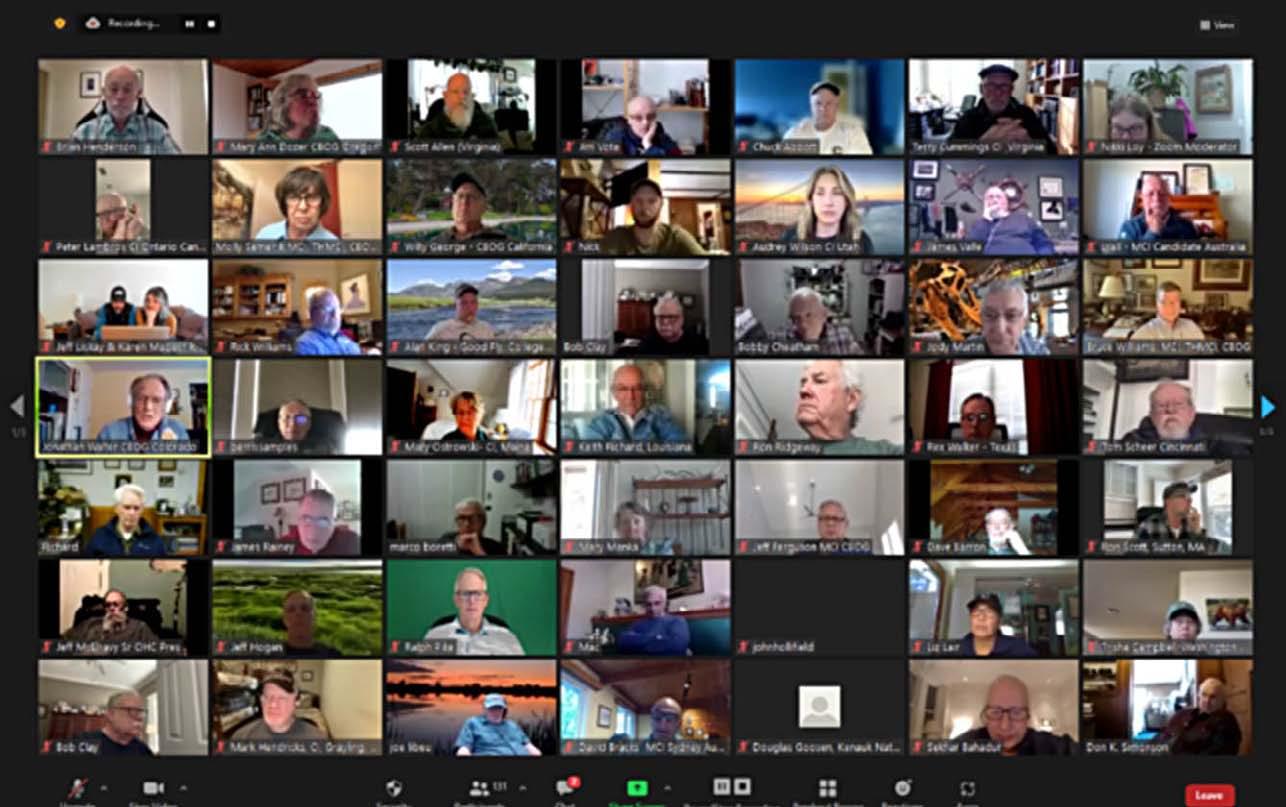
Fig. 1. Screen shot taken during the CBOG Community Gathering meeting of February 5, 2022, showing 1 of 3 screens and 49 of the 131 attendees at this point in the meeting. Meeting organizer and leader Mary Ann Dozer (MCI) can be seen in the top row, second from left.
14
CICP Community Dathering continued ...
THCI and THMCI Distinctions: A two-hand study guide would be helpful, especially explaining the differences between the two exams. Fly Casting Skills Development: The new revision is well received and helpful, far more palatable than before and a good basis for instructor lesson plans; it should be promoted via Facebook and other social media to reach larger audiences.
Continuing Education: The virtual approach is appreciated, but CE events would be better in person; more and larger local events, and events targeting specific topics, would be helpful.
Building Enthusiasm for Casting Instruction (Marketing Casting Instruction): Increased use of social media and more engagement with youth are needed; the best fit customers are beginners and those frustrated by casting. Establishing themes for lessons would be helpful.
Building Enthusiasm in Our Community (Community Connections): Zoom meetings and similar communications are better than email. Social media casting sessions would be helpful, as would good natured inter-council casting competitions.
Perhaps more important than the concrete suggestions received were the numerous responses indicating the willingness of the community to continue to work together, the opportunity for shared voices to be heard from every quarter, and the promise from the CBOG to facilitate many of the suggested changes, including additional meetings like this one. Two comments from attendees following the meeting summed up the experience nicely: “It was a great event and exceeded my expectations. Great to see CICP folks beyond CBOGs!” and “It was a damn good program. We have quite a unique and special connection, don’t we?”
Any virtual meeting of this size takes considerable thought, planning, and perseverance, and we would be remiss if we did not thank and acknowledge Nikki Loy, the FFI Casting Coordinator, for her tremendous help and expertise in the planning and implementation of this meeting. We hope the meeting is the first of many such community gatherings in the years to come.
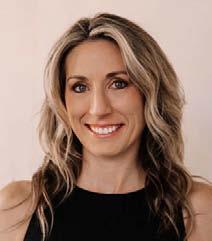
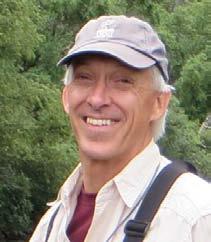
Audrey Wilson, CI, founder of At First Cast, has always been passionate about leadership and is serving as a civilian leader in the Air Force and leading the Utah Casting for Recovery non-profit program. Audrey is a multiple tournament champion and is a FFI certified casting instructor. She supports and provides experiences dedicated to connection, kindness, and inclusion.
Jody Martin, CI, is Associate Vice President for Research and Curator of Crustacea at the Natural History Museum of Los Angeles County. The author of The Spirituality of Fly Fishing (2016), he teaches classes and hosts fly fishing retreats based on his book in California and Pennsylvania. His writing appears in TROUT, Southwest Fly Fishing, American Fly Fishing, Strung, California Fly Fisher, The American Fly Fisher, and elsewhere. Jody is the Casting Director for the Southwest Council of FFI and a member of Sierra Pacific Fly Fishers, where he also serves as a volunteer for Casting for Recovery and Project Healing Waters Fly Fishing
15
INDEX
THE LOOP, SPRING 2022
A Revised CI Exam
James Sommercorn
The Casting Board of Governors has approved revisions to the Casting Instructor Certification Program’s Casting Instructor Exam that will become effective June 1, 2022.
The CI Written Exam, which dates to 2011, has been updated to bring it in line with the emphasis on teaching that was introduced in the CI Performance Exam in 2015. The new 36-question exam remains a mixture of True/False and Multiple Choice questions that are now weighted heavily toward casting mechanics, teaching methods, and lesson planning. Questions about fly tackle are limited to matters that pertain to teaching fly casting. Other topics, such as knots and general fishing knowledge, are not subjects of the new CI Written Exam.
The revised CI Performance Exam, which is posted here under the heading ‘Resources for CI Certification’, is very similar to the current exam. Based on results of a survey of Master Casting Instructors, the performance exam was revised primarily to clarify task descriptions and expectations. A page of diagrams is included to that end. It is formatted like the MCI Exam with both general and task-specific performance standards. A uniform set of evaluation criteria for teaching tasks was included to help candidates prepare for, and examiners evaluate, teaching performance.
Task 7 (Slack Line Presentations) was divided into separate tasks to simplify evaluation of task performance and scoring. To avoid lengthening the exam, Tasks 4 and 5 (Reach Mends) were combined. An objective of the revision was to improve spiraling to the MCI Exam with its expanded emphasis on anchored casts.
Accordingly, a roll cast teaching task was added to the new CI Performance Exam. To make room for the new teaching task, Task 20 (Timing) was dropped as a teaching task, but timing was included as an option in the fault identification and correction task.
A revised mandatory CI Exam Workshop and a new CI Study Guide are being developed.
The new CI Exam is the work of a previous Exam Committee that comprised Steve Hollensed and Bryan Martin, Co-Chairs, and members Thomas Berggren, James Sommercorn, and Sekhar Bahadur. James Sommercorn also led the efforts of the CI Exam Subcommittee that included Bruce Richards and Jim Wigington. Please direct questions concerning the new CI Exam to: casting@flyfishersinternational.org.
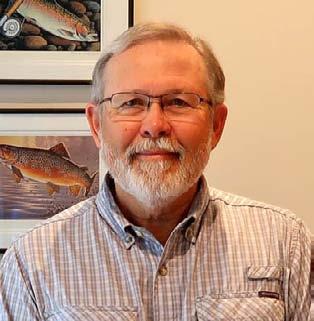
James Sommercorn, MCI, teaches fly casting in Sun Valley, ID and in Scottsdale, AZ.
LOOP, SPRING 2022
THE
16 INDEX
NEW REGISTERED INSTRUCTORS
BECOMING A CERTIFIED CASTING INSTRUCTOR
If you decide to pursue certification it is recommend that you review all the material on our website, as well as find an MCI or THMCI who can mentor you through the process. The chance for success of passing the examinations is much greater for those who find a mentor. You can find an instructor/mentor in your area by clicking here.
Objectives of the Casting Instructor Certification Program (CICP):
The CICP Program’s main objectives are to educate and enhance the growth of fly casting instructors by:
• Establishing high and consistent standards for casting instructors.
• Administering a test that fairly and consistently assesses the
candidate’s knowledge of casting, teaching ability, and casting proficiency.
• Conducting teaching workshops as a required part of certification.
• Conducting clinics on how to teach fly casting at FFI shows, fairs, and consumer fishing demonstrations.
• Developing and maintaining an instruction reference for certified instructors.
• Establishing and maintaining communication networks for certified instructors.
• Facilitating the exchange of ideas between instructors worldwide.
Good luck with your journey to become a certified instructor.
For incoming test date and other CICP events information, please visit:
http://flyfishersinternational.org/Casting/CalendarofEvents/tabid/616/Default.aspx
17
LOOP, SPRING 2022 INDEX
THE
Richard Montgomery Gulf Breeze Florida United States CI 03/04/22 First Name Last Name City State/Locality Country Certi cation Test Date Gerald Yates Lake Junaluska North Carolina United States CI 08/20/21 Martin Penton Southborough Kent United Kingdom CI 11/25/21
Certified Instructors listed according to test date.
Newly
The Editorial Team
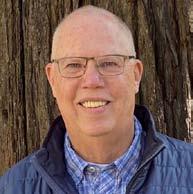
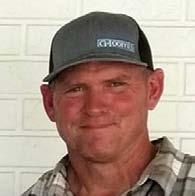
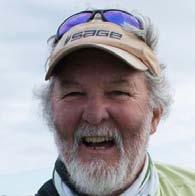
Jim Wigington, MCI, Editor-in-Chief, Redding, California USA. Jim is a retired research hydrologist who spent his career evaluating the effects of human activities on watersheds and streams. He has published in many scientific journals and previously was Editorin-Chief of the Journal of the American Water Resources Association. Currently, Jim is an active casting instructor and L-1 examiner.
Mac Brown, MCI, is the owner of Mac Brown Fly Fish and Fly Fishing Guide School in Bryson City, NC. He is the author of Casting Angles and contributor to numerous magazine articles. Mac will serve as a technical advisor for the Loop. He enjoys adventure travel with his family when not teaching fly fishing techniques.
Peter Morse MCI is a professional Australian fly fisherman of many years who fishes in all waters for all species without prejudice. He is the author of countless magazine stories and 3 books, as well being a television presenter and script writer.
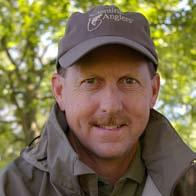
Bruce Richards, MCI, Montana, USA, designed many great lines for Scientific Anglers and wrote the seminal work, Modern Fly Lines. He is a former chair of CBOG and was instrumental in the development of the Casting Instructors’ Certification Program (CICP). All correspondence to be addressed to: loop@flyfishersinternational.org - Website: http://flyfishersinternational.org/ Copyright © 2022, Fly Fishers International (FFI) The Loop and the individual contributors. All materials contained in this publication are protected by United States copyright law and may not be reproduced, distributed, transmitted, displayed, published or broadcast without the prior written permission The Loop and the author or contributor of that content. However, you may download material from The Loop for your personal, noncommercial use only. Links to Web sites other than those owned by the FFI are offered as a service to readers. Neither the FFI nor the editorial staff of The Loop was involved in their production and they are not responsible for their content.

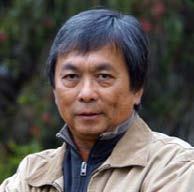
Paul Brown, MCI, THMCI & L-1 Examiner, England. Paul is also a member of the UK’s Game Angling Instructors’ Association (GAIA) and holds the Advanced Professional Game Angling Instructors’ qualification (APGAI) in both double-handed and single-handed and is also a qualified GAIA Mentor and Assessor. Paul is a published author of children’ books, he also has 30 years media experience with some of the best ad agencies in England.
Bintoro Tedjosiswoyo is a CI & THMCI who lives in Melbourne, Australia. Bintoro is a commercial graphic designer and illustrator, he is The Loop’s graphic design editor and illustrator.
18 THE LOOP, SPRING 2022 INDEX



















